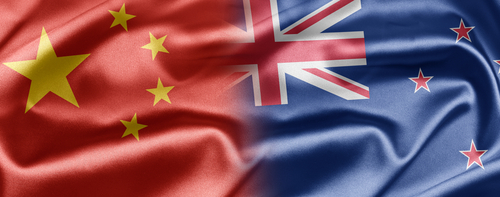In what appears to be yet another example of a foreign government with trade ties to China making a pragmatic policy effort to appease Beijing, New Zealand’s Deputy Prime Minister Bill English last week cancelled a planned meeting with two high-profile Hong Kong pro-democracy leaders. China has been New Zealand’s largest trading partner since the signing of a free trade agreement in 2008—the first agreement signed between Beijing and a developed country. Last week, Reuters’ Ben Blanchard reported on the cancelled meetings with former legislator and founding chairman of HK’s Democratic Party Martin Lee, and former Chief Secretary and elected Legislative Council member Anson Chan:
English said in an emailed statement that he canceled the meeting with former Hong Kong legislator Martin Lee and former colonial chief secretary Anson Chan on the eve of the appointment after he was advised it was “diplomatically sensitive”.
New Zealand has been more careful recently than neighbor Australia not to offend China as both Pacific countries jostle for export opportunities in the Asian giant.
“This is the first time it’s happened to me like this, a meeting was canceled at the last minute,” Lee told Reuters. [Source]
Since the lead up to the pro-democracy “Umbrella Movement” of 2014, there have been heightened political sensitivities in Hong Kong, a special administrative region of China. Early this month democracy activist Joshua Wong, a main student organizer of the 2014 movement, was detained in Thailand, apparently on the request of Beijing; Wong and two other student leaders had earlier received relatively light but “unnerving” sentences for their 2014 activities. Last week, three newly elected Hong Kong legislators were barred from entering the legislature after protesting a required allegiance oath to Beijing. This week, Beijing warned that independence campaigners in Hong Kong and Taiwan were seeking to join forces, and the former pro-Beijing president of Hong Kong’s Legislative Council (who stepped down last month) warned that China would consider a national security response if the first half of the “one country, two systems” policy were to be challenged.
New Zealand attracted rebuke from China’s Ministry of Foreign Affairs earlier this month, after NZ Defense Minister Gerry Brownlee expressed support for an international tribunal’s ruling against Beijing’s claims in the South China Sea that China has refused to recognize as legitimate. Shortly after, Chinese state media reported that Beijing and Wellington had vowed to further promote cooperation, which included a promise that New Zealand would remain impartial on the South China Sea.
Human Rights Watch’s China Director Sophie Richardson castigated Wellington’s decision to cancel the meeting with the two celebrated Hong Kong democrats, urging New Zealand to remember its fundamental principles and not cave to the “authoritarians in Beijing” with its China policy:
“Diplomatically sensitive” – that was the reason cited by senior New Zealand government officials, including Deputy Prime Minister Bill English, for their shocking and ultimately cowardly last-minute cancellation of a meeting with long-time Hong Kong democracy leaders Martin Lee and Anson Chan. Not one official from the governing National Party received the pair in Wellington, though representatives of the Labour and Green Parties did.
New Zealand would do well to remember that principles it considers fundamental – the rule of law, a free press, rights to political participation, and the right to peacefully criticize authorities – are under ferocious assault in China. In Hong Kong, Chan, Lee, and tens of thousands of students and others have protested peacefully for their right to make decisions about policies in Hong Kong themselves. Local and national leaders’ responses have ranged from rejecting those requests to prosecuting some of the student leaders for their efforts. […] [Source]
At the Hong Kong Free Press, London-based human rights activist Benedict Rogers situated the Deputy Minister of New Zealand’s decision to cancel the meeting with Lee and Chan into the broader international trend of foreign governments, businesses, and institutions attempting to curry favor with Beijing for economic reasons. Rogers’ essay calls for an end to the “shameful kowtowing to China”:
[…] The kowtowing of too many governments and other international actors, from universities to Hollywood, towards the thuggish regime in Beijing has resulted not just in tongues licking the boots of the Chinese Communist Party, but tongues then being trapped beneath those boots and thus shamefully silenced.
[…] Britain’s David Cameron and George Osborne went way overboard in their fawning subservience to China, as the Conservative Party Human Rights Commission’s report, titled “The Darkest Moment: The Crackdown on Human Rights in China 2013-2016”, detailed. Theresa May indicated a new caution, though in the end she bowed to pressure and approved Hinkley Point, a sad day for Britain. Canada’s Justin Trudeau is like a desperate teenage lover slobbering over his uninterested girlfriend. Vancouver even put up Chinese Communist flags to prove Justin’s undying love. How low can one go?
[…] As long as lawyers are harassed, intimidated, monitored, followed, detained, locked up; as long as Christian crosses and churches are torn down; as long as Uighur Muslims are told crudely that they can’t grow beards or fast during Ramadan; as long as Tibetan Buddhists find their culture decimated; as long as Falun Gong practitioners are beaten, jailed, slaughtered; and as long as Falun Gong practitioners and others are cut open, their vital organs stolen and sold to others, and as long as there is no international, independent scrutiny of China’s organ transplant system, and no international inquiry into China’s crimes against humanity, I do not trust what China says.
So the solution? All of us, around the world, must stand up to Beijing. Enough of kowtowing. […] [Source]
Read more about the recently growing tendency towards acquiescence to Beijing by both governments and non-governmental actors—including Hollywood studios, publishing firms, news organizations, foreign technology firms, and universities—via CDT.







